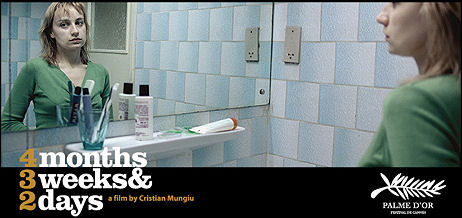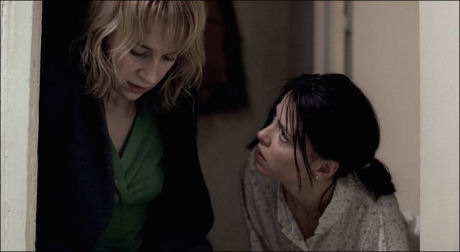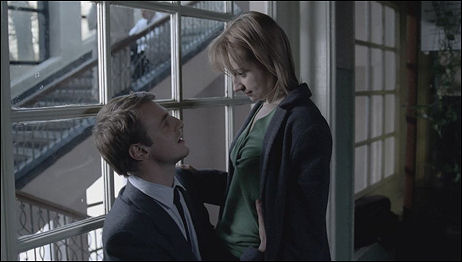I finally caught up with Cristian Mungiu‘s 4 Months, 3 Weeks & 2 Days last Friday, and when it was over I was stunned. Half-staggering in a slightly amazed daze. The heavy praise that came out the Cannes Film Festival (where I was clumsy enough to miss it) led to expectations of something solid, commendable and probably disturbing. But I didn’t expect to see a masterpiece, which is what this “Romanian abortion film” certainly is.

Anamaria Marinca
Set in 1987, when Romania was a Communist state under Nicolae Ceausescu and a strict law prohibiting abortion had been in effect since 1966, and taking place in a single day, 4 Months, 3 Weeks & 2 Days is about chilliness, insensitivity, the lessening of dignity and the taking of a life. But it’s finally about a journey and where the very last scene leaves the characters (and the audience).
It concerns a pair of female college students — sensitive, anxious and tough Otilia (Anamaria Marinca) and vulnerable, not-especially-bright Gabita (Laura Vasiliu) — and what they have to go through for Gabita to get an illegal abortion. Bureaucra- tic wrangling, sexual blackmail, the danger of something going wrong, reactions of a selfish boyfriend, disposing of the evidence, recovering.
This may sound like a glum Eastern bloc procedural, perhaps something to suffer through or check your watch by. It’s not cheerful, agreed, but the transcendent art and style of this film is so penetrating that the drabness is soon forgotten or ignored. This is a haunting moral tale and a psychologically tense suspense film, as well as the most persuasive anti-abortion argument in any form I’ve ever heard, seen or read.

Anamaria Marinca, Laura Vasiliu
It’s magnificently “acted”, if that’s the right word to use. All great acting is about making the audience forget that lines are being repeated or that performers are going through any kind of rehearsed behavior, and that’s certainly what’s happening here.
Plus it’s shot in a plain, hand-held style by Oleg Mutu (The Death of Mr. Lazarescu) — mostly a series of static shots that are held for long stretches along with maybe five or six tracking shots. What results is a simultaneous rawness and refinement that feels clinical and yet compassionate. I was reminded in a way of early Mike Nichols, particularly Guiseppe Rotunno‘s cinematography for Carnal Knowledge — long takes that are fixed and unmoving, hardly any pans, no slow zooms — with people walking in and out of the frame.
I did what I could to assist two former girlfriends in getting two abortions — one in the mid ’70s, the other ten years later — so I know a little bit about what it feels like peripherally (and a little bit psychologically), but I’ve never felt so immersed in the hard particulars of grappling with the reality of getting an abortion until catching this film last Friday night. I didn’t just feel moved and shaken — I felt changed after it was over.
Marinca is the star — it’s her story (even though the abortion isn’t her own) and she’s in every scene start to finish, and with Mungiu and Mutu pulling the off-screen strings she carries the film on her shoulders. No other actress in any film from any country has delivered a better performance this year.
Vasiliu, a wounded beauty with a look of sad confusion, is just as good in her own quietly desperate way and nearly as affecting, but the biggest stand-out after Marinca is Vlad Ivanov, who plays an illegal abortionist named Mr. Bebe. What a monster, and yet what a carefully spoken and very meticulous manipulator. Not exactly “evil” as much as callous, indifferent — a brute who gets what he wants because he can.

A long scene in which these three sit in a hotel room and hash out the monetary, bartered and medicinal basics of what has to be done for the abortion to take place is the heart of the film, and it’s unforgettable.
This has to be an absolute lock for a Best Foreign Language Feature nomination, and I’m thisclose to saying it’s a lock to take the Oscar. Anyone who sees this film and doesn’t feel shaken and humbled has a major aesthetic blockage thing going on. There are times when viewers saying “good film but too depressing” can’t be and must not be tolerated. This is one of those burn-through movies that says basic things in ways that make other filmmakers say, “Why didn’t I think of that?” (Or, in the Mike Nichols-Giuseppe Rotunno sense, “Why didn’t I revisit that?”)
4 Months, 3 Weeks & 2 Days is said to be the first part of a trilogy, or perhaps a longer series of films, that Mungiu will make about life in Communist Romania called The Golden Age. He’s obviously got a vein to mine and a good handle on the Romanian Ceausescu history, but I wouldn’t want to see Mingiu get hung up on it. There’s now, after all, and always what’s yet to come.
IFC Films is waiting until early January to release it, i.e., after the awards and nominations will have accumulated.









